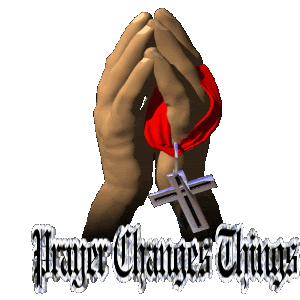Spreading God's Love Thru Prayer
Bipolar Disorder Center
Bipolar disorder, which used to be called manic depressive illness or manic depression, is a mental disorder characterized by wide mood swings from high (manic) to low (depressed).
Periods of high or irritable moods are called "manic" episodes. The person becomes very active, but in a scattered and unproductive way, sometimes with painful or embarrassing consequences. Examples are spending more money than is wise or getting involved in sexual adventures that are regretted later. A person in a manic state is full of energy or very irritable, may sleep far less than normal, and may dream up grand plans that could never be carried out. The person may develop thinking that is out of step with reality psychotic symptoms such as false beliefs (delusions) or false perceptions (hallucinations). During manic periods, a person may run into trouble with the law. If a person has milder symptoms of mania and does not have psychotic symptoms, it is called a "hypomanic" episode.
The vast majority of people who have manic episodes also experience periods of severe depression. If manic and depressive symptoms overlap for a period of time, it is called a "mixed" episode. In some people, moods alternate rapidly or it is difficult to tell which mood depression or mania is more prominent.
Symptoms
During the manic phase, symptoms can include:
High level of energy and activity
Irritable mood
Decreased need for sleep
Exaggerated, puffed-up self-esteem
Rapid or "pressured" speech
Rapid thoughts
Tendency to be easily distracted
Increased recklessness
False beliefs (delusions) or false perceptions (hallucinations)
During elated moods, a person may have delusions of grandeur, while irritable moods are often accompanied by paranoid or suspicious feelings.
During a depressive period, symptoms may include:
Distinctly low or irritable mood
Loss of interest or pleasure
Eating more or less than normal
Gaining or losing weight
Sleeping more or less than normal
Appearing slowed or agitated
Fatigue and loss of energy
Feeling worthless or guilty
Poor concentration
Indecisiveness
Thoughts of death, suicide attempts or plans
Treating Bipolar Disorder
There is no way to prevent bipolar disorder, but treatment can prevent episodes from returning.
A combination of medication and talk therapy is most helpful.
Talk Therapy
Talk therapy (psychotherapy) is important, as it provides education and support, and helps the person come to terms with the illness. Sometimes psychotherapy is helpful if the person has to deal with painful consequences, practical difficulties or embarrassment stemming from manic behavior. The person may have suffered some losses either in relationships or at work. A number of psychotherapy techniques may be helpful depending on the origins of the person's problems. The choice of technique depends upon the availability of family support and other social support, and personal preference. It is important to become educated about bipolar disorder and to learn what resources are available for getting support. Cognitive behavioral therapy is designed to help you recognize patterns of thinking that keep you from managing your illness well. Psychodynamic, insight-oriented or interpersonal psychotherapy can help a person to sort out conflicts in important relationships or explore the history behind the symptoms.
Bipolar disorder, which used to be called manic depressive illness or manic depression, is a mental disorder characterized by wide mood swings from high (manic) to low (depressed).
Periods of high or irritable moods are called "manic" episodes. The person becomes very active, but in a scattered and unproductive way, sometimes with painful or embarrassing consequences. Examples are spending more money than is wise or getting involved in sexual adventures that are regretted later. A person in a manic state is full of energy or very irritable, may sleep far less than normal, and may dream up grand plans that could never be carried out. The person may develop thinking that is out of step with reality psychotic symptoms such as false beliefs (delusions) or false perceptions (hallucinations). During manic periods, a person may run into trouble with the law. If a person has milder symptoms of mania and does not have psychotic symptoms, it is called a "hypomanic" episode.
The vast majority of people who have manic episodes also experience periods of severe depression. If manic and depressive symptoms overlap for a period of time, it is called a "mixed" episode. In some people, moods alternate rapidly or it is difficult to tell which mood depression or mania is more prominent.
Symptoms
During the manic phase, symptoms can include:
High level of energy and activity
Irritable mood
Decreased need for sleep
Exaggerated, puffed-up self-esteem
Rapid or "pressured" speech
Rapid thoughts
Tendency to be easily distracted
Increased recklessness
False beliefs (delusions) or false perceptions (hallucinations)
During elated moods, a person may have delusions of grandeur, while irritable moods are often accompanied by paranoid or suspicious feelings.
During a depressive period, symptoms may include:
Distinctly low or irritable mood
Loss of interest or pleasure
Eating more or less than normal
Gaining or losing weight
Sleeping more or less than normal
Appearing slowed or agitated
Fatigue and loss of energy
Feeling worthless or guilty
Poor concentration
Indecisiveness
Thoughts of death, suicide attempts or plans
Treating Bipolar Disorder
There is no way to prevent bipolar disorder, but treatment can prevent episodes from returning.
A combination of medication and talk therapy is most helpful.
Talk Therapy
Talk therapy (psychotherapy) is important, as it provides education and support, and helps the person come to terms with the illness. Sometimes psychotherapy is helpful if the person has to deal with painful consequences, practical difficulties or embarrassment stemming from manic behavior. The person may have suffered some losses either in relationships or at work. A number of psychotherapy techniques may be helpful depending on the origins of the person's problems. The choice of technique depends upon the availability of family support and other social support, and personal preference. It is important to become educated about bipolar disorder and to learn what resources are available for getting support. Cognitive behavioral therapy is designed to help you recognize patterns of thinking that keep you from managing your illness well. Psychodynamic, insight-oriented or interpersonal psychotherapy can help a person to sort out conflicts in important relationships or explore the history behind the symptoms.
Views: 87
Replies to This Discussion
-
I, unfortunately, suffer with bi-polar disorder!! I am taking medication for it but I want to get off it! I know that depression is not of God and I don't know what to do!!!
-
-
I this know this problem very well and have lived with it for nearly 30 years but I also know God can heal me of this problem.
-
-
My younges son suffers from Bipolar Disorder. Sometimes, I do not know what to do to help him. He is almost 21 years old. He had been in trouble with the law, but he is trying to get his life together. He stopped taking his meds and seeking therapy.
-
-
Well written article, and very informative too. I don't know exactly how to describe my mental issues, because the doctor's can't seem to find it either, with all of today's modern medicine, and test equipment. So please keep me in your prayer's, as you are in mine.
-
© 2026 Created by Guardian.
Powered by
![]()




 Guardians Prayer Warriors if you would like to go to our Facebook page please click the buttons. If you would like to open up a Guardians Prayer Warriors group on a different site please contact Guardians Ministry so that we may put the name of your site on the page and you can use Guardians Prayer Warrior tags.
Guardians Prayer Warriors if you would like to go to our Facebook page please click the buttons. If you would like to open up a Guardians Prayer Warriors group on a different site please contact Guardians Ministry so that we may put the name of your site on the page and you can use Guardians Prayer Warrior tags.






